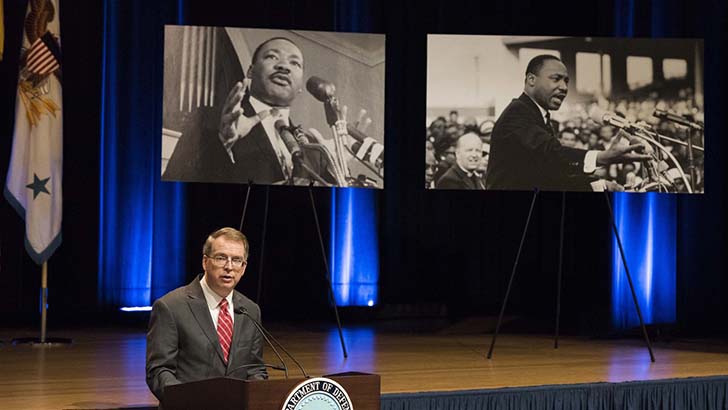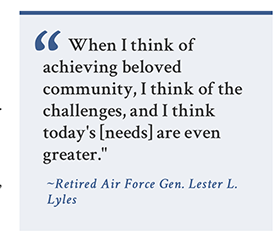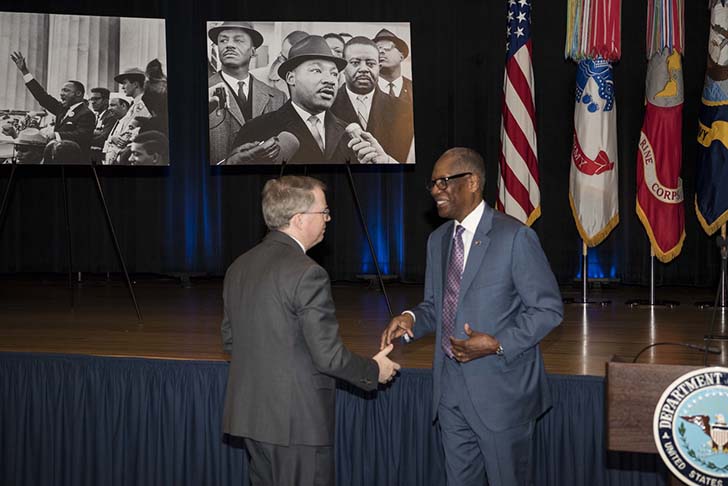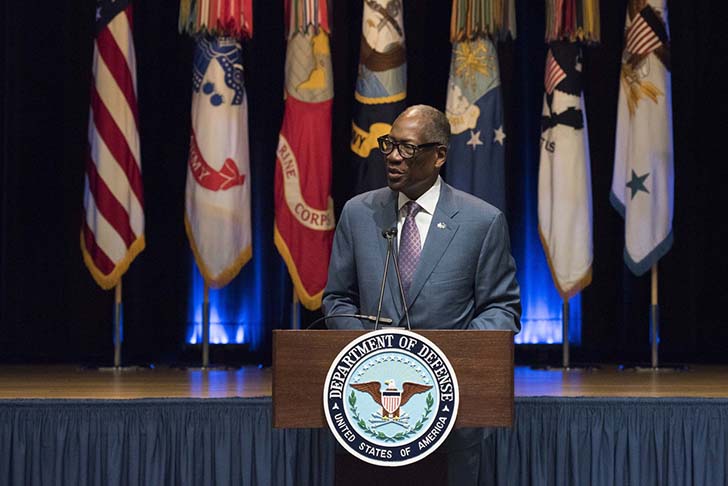| |
King Legacy: 'Fierce Urgency of Now' exists today
By Terry Moon Cronk, DOD
When Martin Luther King Jr. led the 1963 March on Washington for Jobs and Freedom, he described a "fierce urgency of now," said Deputy Defense Secretary David L. Norquist at the Pentagon Auditorium.

Deputy Defense Secretary David L. Norquist makes remarks at the 36th Annual Dr. Martin Luther King Jr. observance ceremony at the Pentagon, Jan. 16, 2020. Image by Navy Petty Officer 2nd Class James K. Lee
|
"And he reminded a divided nation that we needed one another, and that we are stronger when we march forward together," the deputy secretary said at the Defense Department's 36th annual Martin Luther King Jr. observance ceremony to celebrate King's legacy.
Norquist said that a half-century later, King's words continue to ring true: "'We are now faced with the fact that tomorrow is today. We are confronted with the fierce urgency of now. In this unfolding conundrum of life and history, there is such a thing as being too late. This is no time for apathy or complacency. This is a time for vigorous and positive action.'"
 Through King's words and personal example, he inspired a nation and showed us the way forward, the deputy secretary said. Through King's words and personal example, he inspired a nation and showed us the way forward, the deputy secretary said.
"'… Our very survival,' King said in his Nobel Prize acceptance speech, 'depends on our ability to stay awake, to adjust to new ideas, to remain vigilant and to face the challenge of change,'" Norquist said.
"Nothing could be more true for each of us here at the Department of Defense, as we work, each day, to innovate and adapt to meet today's challenges with the 'fierce urgency of now,'" he noted.
The deputy secretary introduced keynote speaker, retired Air Force Gen. Lester L. Lyles, who spoke to the impact the 1963 march had on him. He served as vice commander, Ogden Air Logistics Center; commander, Space and Missile Systems Center; director, Ballistic Missile Defense Organization; vice chief of staff, Headquarters U.S. Air Force; and commander, Air Force Materiel Command.

Air Force Gen. Lester L. Lyles (Ret.) shakes hands with Deputy Defense Secretary David L. Norquist at the 36th Annual Dr. Martin Luther King Jr. observance ceremony at the Pentagon, Jan. 16, 2020. Image by Navy Petty Officer 2nd Class James K. Lee
|
A native of Washington, Lyles was a college freshman when he said he was significantly moved by people of all races and both genders taking part in the 1963 march and by King's speech at the Lincoln Memorial, known as the civil rights leader's "I Have a Dream" speech.
King, that day in 1963, spoke of "beloved community," and the "fierce urgency of now," Lyles noted.
We've accomplished a lot in civil rights but we still have a lot to achieve, even in 2020, and that fierce urgency of now is still relevant, he told the Pentagon audience.
"When I think of achieving beloved community, I think of the challenges, and I think today's [needs] are even greater," Lyles said.
"We still have some budding racial divisiveness, growing political divisiveness, expanding partisanship and we still need to work on things where we're making progress — things like diversity and inclusion and lots of other societal ills and issues," the retired Air Force general said.
As in 1963, the urgency of addressing those issues is now, Lyles said. "We can't rest on our laurels, we can't assume they're all done or somebody else will take care of them. We need to address them ourselves."
Ten years ago, Congress and the National Defense Authorization Act of 2009 and 2010 challenged then-defense secretary Robert M. Gates to put a commission together to look at diversity and leadership in the military, and Lyles was a member.

Air Force Gen. Lester L. Lyles (Ret.) delivers the keynote address at the 36th Annual Dr. Martin Luther King Jr. observance ceremony at the Pentagon, Jan. 16, 2020. Navy Petty Officer 2nd Class James K. Lee
|
The premise was why does the military — and civil servants — have relatively few women and minorities in top leadership positions? he postured.
The commission addressed 16 questions and sought to figure how DOD could ensure a beloved, diverse community that's leading the organizations while accomplishing its mission, Lyles said.
Among the recommendations that came out were ensuring diversity and inclusion is a strategic competency in the U.S. military, particularly, in the Pentagon; making sure the tone from the top is very clear; developing future diverse leaders; and offering mentoring and career development to make people the best they can be. Also recommended were efforts to create an outreach for a greater pool of future diverse leaders; ensuring DOD has continued progress such as accountability; and promotion of leaders who champion diversity and inclusion, he noted.
Similar to King's objective in the 1963 march, "We tried to ensure that DOD would create a diverse and beloved community for all military organizations at all levels," Lyles said.
Published February 12, 2020 |

